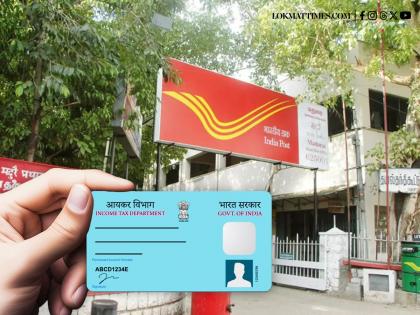PAN Card Scam: IPPB Customers Targeted in New Phishing Attack – Know How It Works and How To Stay Safe
By Lokmat English Desk | Updated: January 10, 2025 13:48 IST2025-01-10T13:38:03+5:302025-01-10T13:48:56+5:30
India Post Payments Bank (IPPB) has issued a warning to its customers about a phishing scam targeting post office ...

PAN Card Scam: IPPB Customers Targeted in New Phishing Attack – Know How It Works and How To Stay Safe
India Post Payments Bank (IPPB) has issued a warning to its customers about a phishing scam targeting post office payment bank account holders. Many customers have fallen victim to the scam where fraudsters use PAN card details to empty bank accounts. IPPB has urged its customers to avoid sharing sensitive information if they receive suspicious messages or calls.
How the PAN Card Scam Works
IPPB customers are receiving messages asking them to update their PAN card details. The messages claim that failure to update the information will result in their bank accounts being blocked. These messages contain links that, when clicked, lead customers to scammers' websites.
PIB’s Warning
The PIB has posted a warning on social media, stating that many people are receiving messages claiming their post payment bank accounts will be blocked within 24 hours unless they update their PAN card information. This claim is false. India Post never sends such messages. Customers are advised to avoid clicking on unfamiliar links and sharing personal details.
Claim: The customer's India Post Payments bank account will be blocked within 24 hours if their Pan card is not updated. #PIBFactCheck:
— PIB Fact Check (@PIBFactCheck) January 4, 2025
❌ This claim is #Fake
➡️ @IndiaPostOffice never sends any such messages
➡️ Never share your personal & bank details with anyone pic.twitter.com/B7CEdp0g2f
India Post has also clarified that it does not send such messages and will not do so in the future.
Keep your finances secure with safe digital banking practices! Regularly update passwords, avoid fake customer care numbers, monitor your accounts, and avoid suspicious links. Be cautious with public Wi-Fi, and always verify the authenticity of banking communications. Your… pic.twitter.com/nGBA9xvMHz
— India Post Payments Bank (@IPPBOnline) December 31, 2024
Read Also | Mumbai Torres Scam: Firm Accused of Duping Investors of Rs 13.48 Crore With False Promises of High Returns
What is a Phishing Scam?
A phishing scam is a type of cyberattack where fraudsters target individuals via emails, text messages, phone calls, or other communication methods. The goal is to trick victims into providing personal information such as financial details or system login credentials.
Precautionary Steps for Customers
IPPB has provided guidelines to help customers protect themselves from phishing scams. Customers are advised to regularly update their passwords, avoid fake customer service numbers, monitor their bank accounts, and refrain from clicking on suspicious links. Caution is also recommended when using public WiFi.
Open in app